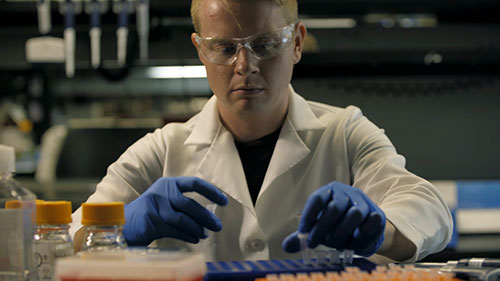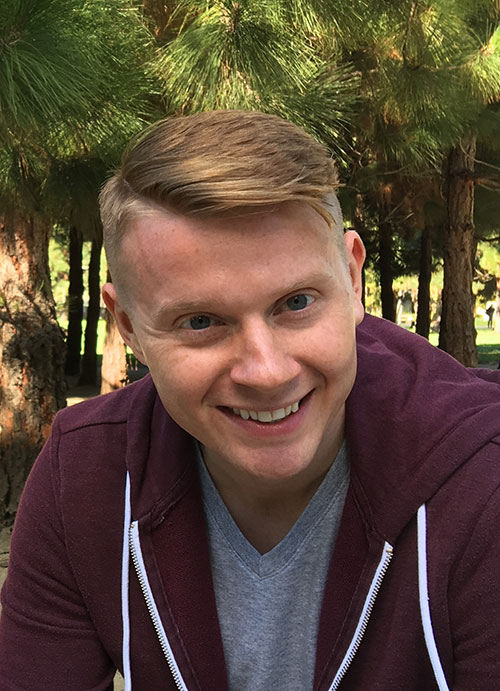
Dr. Judd Hultquist is an Assistant Professor of Medicine at Northwestern University. He has previously conducted HIV research at the University of California, San Francisco, and the Gladstone Institutes, and is the recipient of an amfAR Mathilde Krim Fellowship in Basic Biomedical Research with the support of GenerationCURE. In observance of National Gay Men’s HIV/AIDS Awareness Day on September 27, amfAR spoke with Dr. Hultquist about the challenges, and rewards, of being a gay man involved in HIV research.
amfAR: How did you become interested in science?
Judd Hultquist: The living, growing, ever-changing world always fascinated me. As an undergraduate, I did some independent study in a plant biology lab deciphering the sexual differentiation pathways of Zea mays (corn… I grew up in Wisconsin). In this work, I discovered a small molecule that helped control the male versus female development pathway of corn reproductive tissue. It is in these moments of discovery that scientists really are made. It is the job of scientists to discover things that have never been known before, prove it to themselves and their colleagues, and then try to communicate it with the world. It is profoundly difficult, but at the same time so exciting.
amfAR: Is there a specific event or moment you recall solidifying your commitment to HIV research?
Hultquist: I started to work on HIV in graduate school, not long after I had come out to my family and friends. This was in the background of a concerted effort on behalf of state legislatures to enact anti-gay marriage amendments to their constitutions. The misconceptions and deceitful tactics used in supporting this narrative depressed me greatly and emphasized, in my mind, the strong need for bipartisan communication and fact-based policy. I had seen the power of science to inform healthy policies and aid in better understanding, so I gravitated towards a field where I felt like I could best help my community. Besides, on a molecular level, HIV is an absolutely fascinating biological entity and that drew me in intellectually.
I had seen the power of science to inform healthy policies and aid in better understanding, so I gravitated towards a field where I felt like I could best help my community.
amfAR: Can you summarize the research you’re currently working on?
Hultquist: I am just starting up a new lab at Northwestern Medicine in Chicago focused on understanding how HIV interacts with the human body on the molecular level and how this differs between individuals. Using high-throughput technologies, I quantify molecular changes that occur during infection and use them to build models that can explain the functional differences that link different viruses to different treatments and patient outcomes. Every person and everybody living with HIV is different, yet we prescribe the exact same regimens and expect them to work for everyone in all cases. This simply isn’t effective, but we finally now have the tools to understand both why and how we can fix it.
amfAR: Historically, HIV researchers and advocates in the gay rights community had a sometimes tense relationship. How have things changed, in your view, and how might researchers and advocates work together more effectively?
Hultquist: That’s very true and very unfortunate. This has always been a multifaceted problem, but I think we are beginning to make progress.
At the start of the epidemic, scientific leadership was no different from a lot of other fields; it was principally an ‘old boys’ club.’ Combine that with political indifference, a cumbersome bureaucracy, and a healthcare system focused on profits, and you have a system primed for failure in an emergency, especially one that primarily impacts a minority community. This is not to minimize the incredible achievements and progress made, but any loss of life is tragic and we all need to bear responsibility for the failures that victimized so many people.
While some of the larger problems are systemic and require political and structural changes (VOTE!), the research community has made strides to ensure that the communities we serve are actually seeing their needs met. We try to keep constant, open dialogues with patient communities to better understand their current needs. We use this feedback to both design more impactful studies and to inform funding agencies to commit resources to these areas.
Advocacy groups continue to do a phenomenal job in keeping us updated while also pushing the system to better serve the people. Another small, but meaningful improvement is that now we are beginning to see cross-community representation in science. People such as myself who grew up during the AIDS epidemic, who identify as LGBTQ, and saw the great need for scientific progress and fact-based policy, now are beginning to come into positions of power themselves as doctors, researchers, and politicians with the drive and the means to begin to enact meaningful change.
amfAR: Even though gay and bisexual men make up the majority of Americans infected with HIV, half aren't receiving ongoing care or getting the virus-suppressing drugs they need to stay healthy. Why are so many infected men not getting proper treatment?
 Hultquist: Let’s consider this from the other way around. Of the over 1.2 million people in the U.S. living with HIV, it is estimated that 15% don’t know their status and 10% don’t have healthcare. Those who do have reliable healthcare and do know their status face quite a daunting treatment regimen: thorough and at times invasive onboarding, frequent doctor visits, and the daily administration of an antiviral drug cocktail. Many people are not in a financial situation that supports the cost of medication and frequent medical visits. Many workplace environments only offer limited benefits, no paid time off for medical care, and limited flexibility.
Hultquist: Let’s consider this from the other way around. Of the over 1.2 million people in the U.S. living with HIV, it is estimated that 15% don’t know their status and 10% don’t have healthcare. Those who do have reliable healthcare and do know their status face quite a daunting treatment regimen: thorough and at times invasive onboarding, frequent doctor visits, and the daily administration of an antiviral drug cocktail. Many people are not in a financial situation that supports the cost of medication and frequent medical visits. Many workplace environments only offer limited benefits, no paid time off for medical care, and limited flexibility.
In addition, stigmatization of LGBTQ people and people living with HIV prevents many from seeking care for fear that family members, friends, and community members will find out and reject them. Mental health and other risk factors that influence a person’s tendency to receive treatment also play a role. And it only takes one of these roadblocks at any one point in a person’s life to result in treatment gaps and/or cessation. No one wants to get sick, so the question really is not why are they not getting proper treatment, but how are we failing to make it accessible.
amfAR: The PrEP pill Truvada has been slow to catch on. A recent study found that one in four eligible men who have sex with men have reported using PrEP. These numbers seem to be improving each year, but how do we overcome the barriers to access, especially among communities most at risk?
Hultquist: A lot of the same social, economic, and structural barriers that are limiting access to treatment are also limiting access to PrEP. But, whereas there is a strong motivation to seek treatment, the only motivation to seek PrEP is someone’s understanding of their own risk. And, to put it frankly, we are terrible at weighing our own risks. How many gay men know the prevalence of HIV in their community? How many know the rate of transmission? How many are comfortable discussing their sex behavior with their doctors? Probably not many.
I think the most impactful thing we can do right now is to educate, educate, educate. One of the best things we can do is act as ambassadors within our own communities, having conversations with our friends and partners to ensure we are all protecting ourselves with all of the tools available.
amfAR: Beyond barriers to accessing therapeutic and prevention tools such as PrEP, what else do you see as the most pressing concerns for the LGBT community to address?
Everybody living with HIV is different, yet we prescribe the exact same regimens and expect them to work for everyone in all cases. This simply isn’t effective.Hultquist: I think that we need to have honest conversations within our communities about love, respect, and beauty, broadening our ideals and rejecting our standards that often weigh things against the urban, professional, white, gay male narrative. The LGBTQ community cuts across every demographic in the world and I think we have a long way to go in understanding, recognizing, and celebrating our own diversity.
From a health perspective, though, I think we need to be truly concerned about the recent rise of sexually transmitted infections besides HIV, such as syphilis, gonorrhea, and chlamydia, especially in younger populations. Not only are these infections harmful (and increasingly drug-resistant), but they also suggest a drop in condom use and other safe sex practices. There is concern that inadequate education surrounding PrEP may even play a role, as people may feel that HIV is the only reason to use a condom. Providing our community with the tools to be sexually healthy, physically and mentally, should be our goal, not just preventing the spread of one disease or another.
amfAR: As a gay man involved in HIV research, do you feel a particular personal pressure to succeed?
Hultquist: As a scientist I know that my own contributions are minuscule given the vast network of researchers, community advocates, and care providers across the globe who are fighting this same fight and have been for many years. My own community has never been anything but supportive. But as a gay man, I want the fight to be won more than anything else, and being in a position to effect meaningful change in this arena comes with innate pressure to succeed.
A few years ago, one of my very best friends and partners sero-converted. Despite having worked with HIV for many years, I was not in any way prepared for the immense challenges he would face legally, physically, mentally, financially, and socially. Saying that it was hard for me is ridiculous in light of the incredible battles he has had to fight and continues to fight. But his courage and the courage of the entire poz community continue to inspire me on my own scientific and personal journey. We have a long, long way to go on many fronts, but success is ours for the taking! Small victories, one by one, will lead to large victories and ultimately success if we can stand together and dare to keep dreaming of a brighter future.